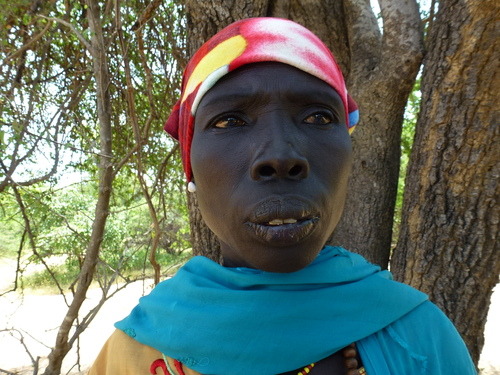
Female, 48 years old
Abducted: 1998
Repatriated: September 26, 2014
I am from Atokthou village. Before I was taken, I was married to a man from Nyamlell.
The year I was captured is called Mapada Crisis Year. One morning, I was cleaning sorghum in my house while my husband was away. I heard a gunshot near my house and all of sudden I saw Arabs on horses and on donkeys coming to my house.
I called my son and three daughters to me, and we started running to the forest. The Arabs caught us in the middle of our farm. They put my children on horses. My hands were tied with a rope and I walked on foot with the Arabs toward Kiir River. For the first day, we walked until night and then we slept in the forest. We ate only peanuts.
There were many Dinka men and women who were captured with us. Six Dinka men were killed because they did not walk quickly. We walked for 10 days, until we arrived in Mathark in North Sudan. We were gathered in one place and the Arabs started dividing us. A group of men took all four of my children. I cried and tried to hold onto them. One Arab stabbed me with a knife. I fell down, and another Arab came and stabbed me with a knife on my back. [Knife marks are visible on Aluet’s hand and her back]. The Arabs left with my children. They thought I was dead and left me on the ground.
Some other Dinkas who were captured by the Arabs and managed to escape found me the ground after the Arabs left. They took me with them. We walked until we arrived in Magilad.
In Magilad I met an Arab named Abakar, whose mother is a Dinka. He took me to his house, and treated me very well. I worked in his peanut fields, cleaned his house and cooked. He has three wives. I stayed with him the whole time I was in North Sudan.
When other Dinka slaves in the area told me about the slave retriever, I went to the market and met him. I told him my story, and he asked me if I wanted to go back to South Sudan. I said yes, even though I did not know what happened to my children. I needed to see South Sudan with my own eyes.
The slave retriever put us in his truck and took us to a large city. From there, we walked on foot to South Sudan. He gave us food to eat on the way.
I do not know if my husband is still alive or not. My four children are still in North Sudan and I do not know anything about them.
Aluet’s four children and thousands of others are still trapped in slavery in North sudan. Please support our efforts to bring them home through Sudan’s Underground Railroad: www.csi-usa.org/donate
